 |
 |
 |
 |
 |
 |
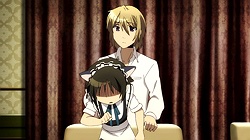 |
 |
 |
 |
 |
 |
 |
 |
 |
 |
 |
 |
 |
 |
 |
 |
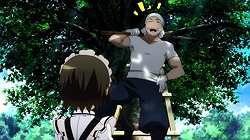 |
 |
 |
 |
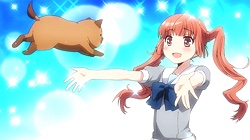 |
 |
 |
 |
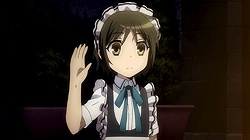 |
 |
 |
 |
 |
 |
 |
 |
 |
 |
 |
 |
 |
 |
 |
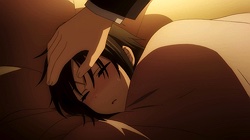 |
 |
 |
 |
 |
 |
 |
 |
 |
「しっぱいは成功の母」 (Shippai wa Seikou no Haha)
“Failure is the Mother of Success”
It’s with no small pleasure but also a fair bit of amusement that I see the reaction of viewers who’ve given this show a chance. By now it’s becoming clear that Shounen Maid is a very good series indeed – one of the warmer and more emotionally effective manga I’ve read in recent years in fact, and the anime is nailing the adaptation. But there’s a unique kind of suspension of disbelief that goes along with Shounen Maid – not with the premise itself, but that such a premise could deliver what it does.
I know this because I’ve experienced that disbelief myself. There’s a process of stages of denial that goes along with this series – the only reason I even gave the manga a chance is because I saw some of the stuff I would later write about it myself in reviews. But when you consider the initial impression it gives off, you try and convince yourself that it can’t possibly be as smart and perceptive as it really is. While it plays out in a completely different way, I had something of the same experience with R-15 – you keep looking for evidence that your initial instinct was right, but it just never comes.
The rest of the cast begins to make its presence felt in this episode, and it’s a very good one. First up is Ootori Miyako (Makino Yui) the young girl who’s part of an omiai (still very common in this social class) with Madoka. Miyako is underage – she doesn’t have to marry until she’s sixteen – and isn’t in love with Madoka. He’s not really the problem – she likes him well enough, but wants to be able to make her own choice. And then there’s the fact that her choice is obviously Keiichirou (Chihiro picks up on this at once, though Keiichirou himself seems to have no idea).
The upshot of all this is that Miyako (after naturally enough initially misunderstanding what’s going on with Chihiro) is struck by the fact that at the age of 11 he’s already striving to be independent, while at 15 or so she’s consumed by her own problems and spoiled by her upbringing. So she apprentices herself to him – with mixed results, yes, but like everything with Shounen Maid the heart is in the right place. It may seem as if Chihiro is unnaturally mature in giving advice about compromise and being true to yourself to a girl several years older than he is, but I see it as a reflection of his mother and how profoundly she was able to inspire Chihiro to be the remarkable boy he is.
Next up come Chihiro’s school friends. The most important of this bunch is Hino Yuuji (Saiga Mitsuki), but they’re all a big part of Chihiro’s life. They’re friends in the truest sense of the word – they know what Chihiro has been through and they’re worried about him, plain and simple. And that doesn’t change when, after a suspicious exchange regarding his circumstances, they follow him to Madoka’s mansion and see him dressed in his full regalia. What’s interesting here is that the absurdity of the conceit is acknowledged within the story itself, but somehow it never becomes a deal-breaker. It’s a neat trick of writing I never would have expected Ototachibana could pull off if I didn’t experience reading it myself.
Finally, we have a charming little aside where Chihiro realizes that he has no idea what Madoka likes to eat and sets his sights on finding out. The best part about this little story is the way it ties Chiyo-san into the narrative, and in doing so reminds us that Madoka too loved her very much. Whenever Chihiro steps back from the moment and realizes how much he misses his mother it hits home like a ton of bricks, and it’s (again) a fine turn of storytelling that something as simple as a rolled omelette can take on such poignancy.
There’s a lot of that “simple yet profound” theme I love so dearly to Shounen Maid – that, and it checks another one of my boxes by being a very different sort of series that it initially appears. It’s a very odd little story, but it’s really a celebration of human decency and compassion. Even as strange a fellow as Madoka is he’s fundamentally a decent guy (as witness the way he gets Miyako off the hook to marry him) – and he too is uncompromising in being himself. The themes here are pretty straightforward and elemental but they’re presented with a lot of restraint and perceptiveness. It’s a hell of a good show – though that’s not going to be an easy thing for a lot of viewers to accept.
「いぬは三日飼えば三年恩を忘れぬ」 (Inu wa Mikka Kaeba Sannen On wo Wasurenu)
“Feed a Dog for Three Days and He Will Remember It for Three Years”
Maybe I’ve become a soft touch, but this show is really working for me. It’s been a while since I’ve read any of these manga chapters (the translations have been stalled for a matter of years) and while I remembered them fondly, I’d forgotten just how impactful they were. Either that, or seeing them play out on-screen gives them a certain additional resonance, which certainly happens often enough with anime adaptations that are handled with care and skill. And this one is, beyond a shadow of a doubt.
The obstacles facing this series when it comes to perception are obvious enough, but long experience with anime has taught me that perception and reality are two very different things. If they were books (well – actually they were) one might easily decide not to read the aforementioned R-15 or Ginga e Kickoff based on their cover – but what a shame that would be. And Shounen Maid has the added baggage of bearing a superficial likeness to material that a certain sort of anime fan finds especially off-putting – threatening even – right down to its title. It’s a lot to overcome, but the irony is that the actual process of enjoying the series and getting wrapped up in the story couldn’t be easier.
That Shounen Maid attacks this problem quite directly is hardly surprising, because the writing really doesn’t have an ounce of artifice to it. It toys with perception by quite openly poking fun at it in a way that never gets in the way of the story it’s trying to tell. It’s an unusual beast among anime in being quite emotionally transparent, especially in the way it approaches parent-child (and stepparent-child) relationships. There’s an honesty to this show which is very appealing, especially in the way it finds an essential truth in situations that in most series are covered in a thick pancake makeup of cliche.
The thing about Shounen Maid is that pretty much everybody in it is a decent person. Not in a flashy, saintly way – just nice. I know that’s not a plus for everyone but I quite like stories that focus on decency, and the heroism of everyday living. Take for example Chihiro’s best friend Yuuji and his grandfather. Under the pretense of taking care of Madoka’s garden after a long absence (don’t get me wrong, it needs it) they come to the mansion expressly to check on Chihiro – just to make sure he’s OK. Ojii-san casually lets it slip out that if Chihiro isn’t comfortable where he is, he would be welcome to come live in their bustling household – no problem. And Chihiro’s school friends notice things about him, changes in his mood and behavior. Not because they’re all that exceptional, but just because they’re his friends and they’re worried about him.
The premise of this episode is Chihiro’s discovery of an abandoned dog on the way home from school. This is mined for some comedy, much of it involving Madoka’ irrational fear of dogs (he loves cats but is allergic to them, poor guy), and the idea that the pup makes a useful guard dog for Chihiro’s bedroom. But it doesn’t end up the way you’d expect – rather than Chihro keeping the dog it’s adopted by Miyako – and the real purpose of the whole incident is to cast new light on the relationship between Chihiro and Madoka.
If one cares to look for them there are some fairly deep and subtle emotional themes being explored in this series. Both Chihiro and Madoka are suffering from abandonment issues – ironically both because of Chiyo, though under entirely different circumstances. And each of them responds in very different ways. Chihiro finds it very hard to trust, and though the lesson of self-reliance his mother taught him was a good one, it’s left him extremely reluctant to allow himself to be cared for. As a child that presents particular problems, but it’s not a problem that’s limited to children by any means.
The way Chihiro’s new cell phone is used to shine a light on all this is a very clever conceit. There’s a clear symbolism here in the way even responding to a message is excruciating for him, while Madoka gives vent to his own insecurities by obsessively messaging his nephew (these two are on opposite ends of the neuroses spectrum in so many ways). I think it’s actually pretty heartbreaking to see Chihiro all alone in the mansion, fighting a cold (refreshingly not overblown into an “anime cold” – just a cold), wanting so badly to hear Madoka’s voice yet not quite able to show that vulnerable side of himself.
Fortunately Madoka’s idiosyncrasies complement Chihiro’s, and he responds to his nephew’s failed attempt at a phone call by taking a taxi for three hours from his work venue to home (leaving poor Keiichirou with just a wig to cover for him), just to check on him. That’s the essence of the story here, really – everybody is broken in some way, but as long as you rely on other people you can get through it. That’s a very powerful message – enough so that a series doesn’t have to beat you over the head with it to be effective, and Shounen Maid never does. This is a show that’s so much more than it appears, so much more than the sum of its parts – and however few viewers out there give it enough of a chance to find that out, I’m glad to have it around.

I enjoyed these two episodes and I’m glad that it’s getting coverage.
As the manga has only 12 chapters translated and a number of volumes in Japan, it’s really great that this series is getting an adaptation.
What I like about this series is that while there are some tropes, each character has more depth to them especially with their interactions with each other.
In a way, the relationship between Chihiro and Madoka reminds me quite a bit of Haruhi and Tamaki of Ouran Highschool Host Club (both pairs even having gender neutral names and one of them being made to look like the opposite gender, lol), with the way Tamaki is, in most other people’s eyes, a handsome, suave, smart, mature, etc. guy (and Tamaki very well can be, like Madoka is shown a few times already) but is far more open with his quirks only to those closer to him like the rest of the club and especially Haruhi, much like Madoka is with Keiichirou and Chihiro.
It’s probably tough on Madoka having to play that kind of role, most likely having it placed on him after Chiyo was pretty much disowned when she chose to do what she wanted rather than follow the family traditions, and it must feel intoxicating to just be liberated of it with what time he has alone with Keiichirou and/or Chihiro.
does chihiro fall for a girl his own age?
Since answering that would be a spoiler, I’d say stay tuned and find out…
I hate that I feel skeevy every time I press play watching this show but I’m so happy that it doesn’t ever take THAT route despite how easy it would be. It’s a very charming and warm show that has a lot of heart to it, and very nice animation that make the ride much easier. It’s not a show for everyone but anyone looking for a cute and genuinely funny slice of life that for once isn’t about four+ girls should give this one a shot.